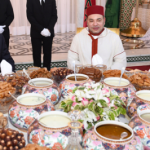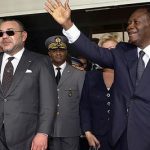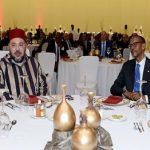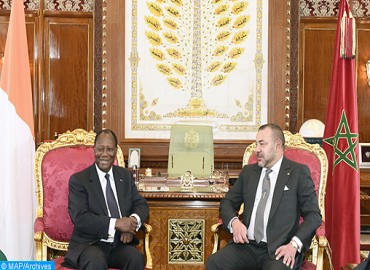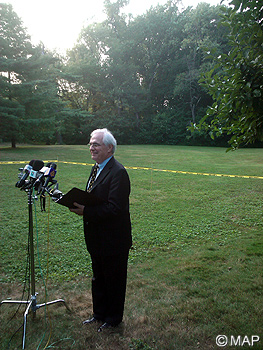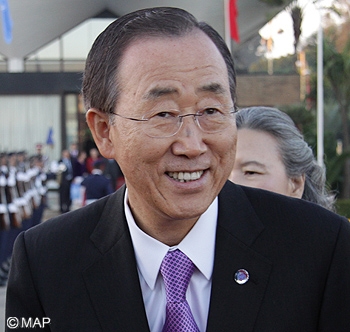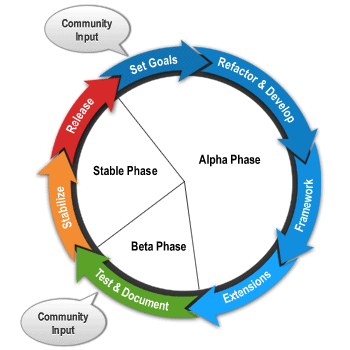HM the King performs Friday prayers at “Tarik Ibn Zyad” Mosque in Tangiers
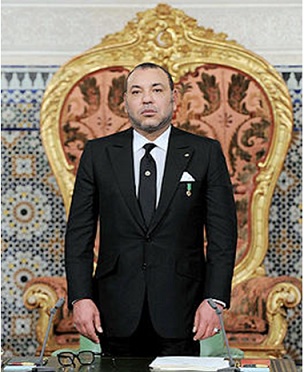 PERSISMA, Tangiers, 28 March 2014 – HM King Mohammed VI, commander of the faithful, performed the Friday prayer at the “Tarik Ibn Zyad” Mosque in Tangiers.
PERSISMA, Tangiers, 28 March 2014 – HM King Mohammed VI, commander of the faithful, performed the Friday prayer at the “Tarik Ibn Zyad” Mosque in Tangiers.
Here follow the full texts of the sermons delivered by the Imam Mohamed Fizazi:
Praise be to Allah, the Cherisher and Sustainer of the worlds, the Clement and Compassionate Who, out of all-abounding Grace, forgives sinners their sins. Praise to Him that says in His masterful revealed Book: “Say: ‘O my Servants who have transgressed against their souls! Despair not of the Mercy of Allah: for Allah forgives all sins: for He is Oft-Forgiving, Most Merciful”.
I profess that He is Allah –the Only God Who has no associates Whose Mercy precedes His Wrath. I profess that our lord, Mohammed, is His servant and messenger, whom He has sent out of mercy to humankind as a lamplight that spreads its light to those who seek guidance and as an intercessor on their behalf on Judgment-Day, a day on which every self will find ready in store any good that it has worked. Peace and blessings be upon him and upon his immaculate Family members, upon his Companions from among the Muh’jirs (the Migrants) and Ans’rs (the Supporters), and upon all those who have followed them in benefaction up until the Day of Judgment.
Now therefore,
Allah (Glory, Majesty, and Perfection be to Him) says in His masterful and glorious Book: “For the covenants (of security and safeguard enjoyed) by the Quraish. Their covenants covering journeys by winter and summer. Let them adore the Lord of this House, Who provides them with food against hunger, and with security against fear (of danger).” Veracious is Allah Almighty! In this S’ra (chapter of the Quran), which is short in structure but splendid in terms of meaning, the True One (Exalted be He) reminds Quraish the tribesmen of the Prophet (Peace and blessings be upon him) of the bounties He has conferred on them, by granting them the means conducive to stability and serenity and by providing them with means which amply meet their requirements in terms of food and drink. He also showed them ways and means to facilitate access to those conditions. He reminded them of the fact that they have become used to the two trips, which had been instituted by H’shim Ibn Abd Man’f, also called Amru, who happened to be the great grandfather of the Messenger of Allah (Peace and blessings be upon him). The trips in question were undertaken to Yemen and to the Sh’m region as part of an economic and social development initiative. This was because the Makkan sacred land consisted of a land that was not propitious to cultivation, as Almighty Allah reminds us in the Noble Qur’n. Quraish people thus needed to build bridges of exchanges and trade with their context, more specifically, with the North and the South in order to procure benefits and secure the means for dignified living.
The word Il’f (covenant, convenience, and familiarity) is used twice in the noble verse; the True One (Exalted in Might be He) suggests that when a human being becomes used to a blessing he might become somewhat heedless of its significance and value –even though the blessing may be mighty indeed causing utter disarray or loss if he should be deprived of it. By means of inimitable rhetorical language, the noble verse suggests that the two trips comprise two mighty boons: the first one of which consists in providing food against hunger. Needless to say, food and drink are the sustenance and the basis of human life and its continuity. For this reason, the immaculate Shari`ah (Revealed Law) commends all those who strive hard to earn their livelihood; advises us to show a sense of economy and rationality in using it; and warns against excess, as stated in the following commandment by Almighty Allah: “Eat and drink: but waste not by excess. For Allah loveth not the wasters” The Shari`ah also recommends expending it or sharing it with people who are deprived of livelihood, pursuant to Almighty Allah’s command: “And they feed, for the love of Allah, the indigent, the orphan, and the captive.” It even commands altruism by giving precedence to people who stand in dire need, as stated in the following verse by the Almighty: “They give them preference over themselves, even though poverty was their (own lot).”
The second boon is security against fear (of danger): Allah has subjected to them secure land whose fruits can readily be reaped and caused people to think highly of them and value them. He then provided them with the means for ready mobility from place to place, without fear of being attacked by brigands or harmed by aggressors. The security is reminiscent of the security enjoyed by the People of Sabaa’ which is described by the Almighty thus: “Travel therein secure, by night and by day.” Indeed there is no blessing that is more splendid than the security felt by a person relative to his selfhood, his honour, his property, and his homeland. Under the aegis of security, worship and interpersonal dealings flourish. By contrast, in the absence of security, neither acts of worship nor any dealings may be had, still less flourish. There can be no faith without security and there can be no security without faith. In the grip of fear and dissension man can never hold fast or uphold his creed, nor can he even practice his worship rituals or undertake any interpersonal dealing.
Upon my life, the Commander of the Faithful, Defender of the Faith, His Majesty King Mohammed VI (May Allah lead his steps aright on the path of rightness and goodness) has not ceased to take initiative upon initiative and to launch major projects for the purpose of creating the conditions for these two mighty boons: the boon of security experienced by people concerning the freedom of their souls and minds from any aggression or confusion likely to undermine their adherence to their religious fundaments and their cherished ethical values; the blessing of stability which makes living easy, facilitates the fight against ignorance, by means of sound education, and enhances the effectiveness of the struggle against poverty through solidarity. And the benefit of the two is evident: enlightenment by means of knowledge and immunity against poverty constitute guarantees and facilitators of greater religious life and more sincere devotion to Allah (Exalted be He). This is because even though all blessings and bounties are granted by Gracious Allah, as stated in this verse: “And ye have no good thing but is from Allah,” the True One has decreed that seeking and making use of the means conducive to good be among the most current and permanent laws of this universe.
Allah we beseech to lead Ameer Al-Mumineen (the Commander of the Faithful) and us to righteous words and deeds. We implore Him to make us benefit from the Noble Quran and the Sunnah (Tradition) established by the lord of the former and the latter. And let our final prayer be, “Praise be to Allah, the Cherisher and Sustainer of the Worlds.”
(End of first sermon)
2nd text of sermon delivered Friday by Imam Mohamed Fizazi during the Friday prayers in presence of HM the King:
“Praise be to Allah by Whose Grace righteous deeds are accomplished and added gifts and boons are bestowed. Permanent and full Peace and blessings be upon the lord of creatures, Mohammed, the Messenger of Allah, thanks to whom foods are grown and blessings are sent down. Peace and blessings be upon his noble Family, and upon his guiding Companions!
Now therefore,
In His inimitably masterful Book, Almighty Allah has decreed that blessings are not likely to be suspended or exposed to evanescence if they are received with due thanks and gratitude. He (Gloried be He) said: “If ye are grateful, I will add more (favours) unto you.” Failure to show gratitude upon receiving a blessing is tantamount to rejecting it and denying the deed of the grantor of that blessing. He (Exalted be He) says in this respect: “But if ye show ingratitude truly My punishment is terrible indeed.”
Gratitude to Allah Almighty is expressed through love, as evidenced by the saying of the Prophet (Peace and blessings be upon him): “Do love Allah for all the blessings He bestows upon you every day.” Love shown by a servant to His Lord is expressed through compliance with His Commands, avoidance of His interdictions, and thankfulness for His bounties. Doubtless, gratitude to Almighty Allah cannot be achieved unless gratitude is shown to the person, through whose hands, such bounties have been granted, or through whose agency such boons have reached one of the creatures. In a Had’th-saying uttered by the Prophet (Peace and blessings be upon Him) and reported by Aby Daw’d in his Sunan (Traditions); by Imam Ahmed in his Musnad (the Ascribed Traditions); and by Al-Bukh’ry in Al-Adab Al-Mufrad (Unique Morals), on the authority of Aby Hureyra (May Allah be pleased with him): “Allah shall not extend thanks to any that fails to show gratitude to people.”
O ye people! One of the calamities of the present age is the dearth of gratitude for Almighty Allah’s bounties and the sparse thanks expressed by people in the course of their interactions and transactions –most especially, towards those who have rendered them a service or seen to their serenity. Likewise, among the manifestations of ingratitude mention could be made of increasing resentment or rancor; failure to attribute all matters to their Originator, Allah the Almighty; and failure to establish a balance between demand for more rights and avoidance of obligations, by shirking them or not fulfilling them. Now to combat such thanklessness and rejection of bounties, speakers ought to do their utmost to ensure that people really understand the inextricable link and tight relation between rights and obligations.
Allah we implore to lavish reward, grant forgiveness, and bestow without account, upon Mawl’na Ameer Al-Mumineen (the Commander of the Faithful), from His inexhaustible stores of grace and bounties –such as no eyes have seen, or ears have heard, or heart has ever felt!
Guide us, O Lord, to the Path of Guidance and grant that we hold fast to Your Book and to the Tradition of Your Prophet. May it please You, O Allah, to be gracious to Mohammad and to the Family of Mohammad as You were gracious to Abraham and to the Family of Abraham, and to bless Muhammad and the Family of Mohammad, as You blessed Ibrahim and the Family of Ibrahim, for surely You are Praised and Magnified.
May You be pleased with the Well-Guided Caliphs, Aby Bakr, Omar, Othman, and Ali, as well as upon the Prophet’s righteous Companions from among the Muh’jirs (the Migrants) and Ans’rs (the Supporters), upon his wives, his progeny, and all the other immaculate and noble members of his Household.
Grant Your support to Mawl’na Ameer Al-M’mineen (the Commander of the Faithful), Defender of the Faith, His Majesty King Mohammed VI. May You Guard him the Way You have guarded the Glorious Qur’n. May You delight his Majesty’s eyes in Crown Prince, His Royal Highness, the Radiant Prince, Mawl’Al-Hassan, mend his ways and let him have good upbringing. May you lend his Majesty’s support through His Royal Highness, the venerable Prince, Mawl’y Rachid, and preserve all the members of the noble Royal Family. We implore You to shelter with Your infinite mercy and abounding grace the two Muj’hid Kings, His Majesty Mohammed V, and His Majesty King Hassan II. May You illuminate their tombs, have them in Your mercy, grant them a seat among those You have bestowed grace upon, from among the Prophets, the Sincere (Teachers of Truth), the Martyrs, and the Righteous Ones.
May You, O Allah, grant support and victory to Islam and Muslims and guide them to tighten their ranks and to unify their word, for the sake of their welfare and rightness. Grant that our country, and all the other Islamic countries, remain secure and tranquil, O Lord of the Worlds!
“Glory to thy Lord, the Lord of Honor and Power! (He is free) from what they ascribe (to him)! And peace on the Apostles! And praise to Allah, the Cherisher and the Sustainer of the Worlds.”

